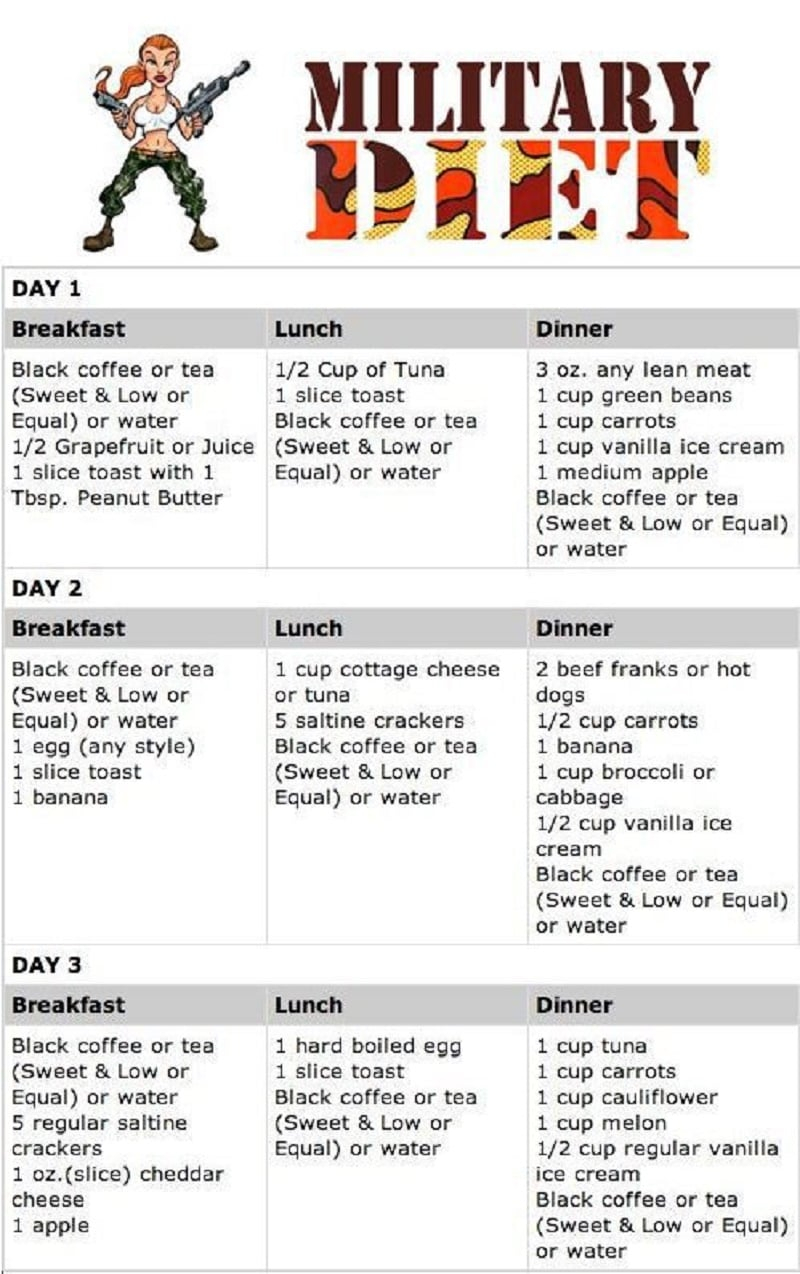The Military Diet is a popular diet plan that has gained a lot of attention in recent years. It is a three-day diet plan that promises quick weight loss results. Many people have tried this diet and claimed to have lost several pounds in just a few days. However, it is important to note that this diet is not sustainable in the long term and may not be suitable for everyone.
Day 1: Military Diet Menu
 The first day of the Military Diet involves consuming a limited number of calories. Breakfast on this day typically consists of a slice of toast with peanut butter, half a grapefruit, and a cup of black coffee. Lunch includes a small portion of tuna, another slice of toast, and black coffee. Dinner comprises of three ounces of meat, a cup of green beans, half a banana, and a small apple. In addition to these meals, you are allowed to have small snacks like carrots or celery throughout the day.
The first day of the Military Diet involves consuming a limited number of calories. Breakfast on this day typically consists of a slice of toast with peanut butter, half a grapefruit, and a cup of black coffee. Lunch includes a small portion of tuna, another slice of toast, and black coffee. Dinner comprises of three ounces of meat, a cup of green beans, half a banana, and a small apple. In addition to these meals, you are allowed to have small snacks like carrots or celery throughout the day.
Day 2: Military Diet Plan
 The second day of the Military Diet is known as the calorie restriction day. It involves significantly reducing your calorie intake to promote weight loss. Breakfast on this day consists of a slice of toast with a poached egg and half a banana. Lunch includes a cup of cottage cheese, a hard-boiled egg, and five saltine crackers. For dinner, you can have two hot dogs without the bun, half a cup of carrots, half a cup of broccoli, and half a banana.
The second day of the Military Diet is known as the calorie restriction day. It involves significantly reducing your calorie intake to promote weight loss. Breakfast on this day consists of a slice of toast with a poached egg and half a banana. Lunch includes a cup of cottage cheese, a hard-boiled egg, and five saltine crackers. For dinner, you can have two hot dogs without the bun, half a cup of carrots, half a cup of broccoli, and half a banana.
Day 3: Military Diet Meal Plan
 The third and final day of the Military Diet is a combination of the first two days. Breakfast consists of five saltine crackers, a slice of cheddar cheese, and a small apple. Lunch includes a hard-boiled egg and a slice of toast. Dinner consists of a cup of tuna, half a banana, and a cup of vanilla ice cream.
The third and final day of the Military Diet is a combination of the first two days. Breakfast consists of five saltine crackers, a slice of cheddar cheese, and a small apple. Lunch includes a hard-boiled egg and a slice of toast. Dinner consists of a cup of tuna, half a banana, and a cup of vanilla ice cream.
While the Military Diet may result in rapid weight loss, it is important to approach this diet plan with caution. This diet is highly restrictive and may not provide all the necessary nutrients your body needs. Additionally, the weight loss experienced on this diet is often temporary and may be due to water weight loss rather than fat loss.
It is important to remember that sustainable weight loss requires a balanced diet and regular exercise. If you are considering trying the Military Diet, it is recommended to consult with a healthcare professional or a registered dietitian to ensure it is safe for you.
The Verdict on the Military Diet
The Military Diet may be appealing to those looking for quick weight loss results, but it is not a sustainable or healthy long-term solution. The severe calorie restriction and limited food choices may lead to nutrient deficiencies and potentially harm your overall health.
 While the Military Diet promises quick results, it is important to focus on making long-term lifestyle changes for sustainable weight loss. This involves incorporating a balanced diet rich in fruits, vegetables, lean proteins, and whole grains, along with regular physical activity.
While the Military Diet promises quick results, it is important to focus on making long-term lifestyle changes for sustainable weight loss. This involves incorporating a balanced diet rich in fruits, vegetables, lean proteins, and whole grains, along with regular physical activity.
Remember, the key to a healthy lifestyle is finding a balance that works for you. It is always recommended to consult with a healthcare professional or registered dietitian before starting any new diet plan. They can provide personalized guidance and support to help you achieve your weight loss goals in a safe and sustainable way.
Conclusion
The Military Diet may attract those looking for a quick fix, but it is important to consider the potential risks and limitations of this diet plan. While it may result in short-term weight loss, it is not a sustainable or healthy approach to long-term weight management.
Focusing on a balanced diet, regular exercise, and overall healthy lifestyle habits is key to achieving and maintaining a healthy weight. It is always recommended to consult with a healthcare professional or registered dietitian before embarking on any new diet plan to ensure it aligns with your individual needs and goals.
 Remember, your health should always be the top priority, and weight loss should be approached in a safe and sustainable manner.
Remember, your health should always be the top priority, and weight loss should be approached in a safe and sustainable manner.